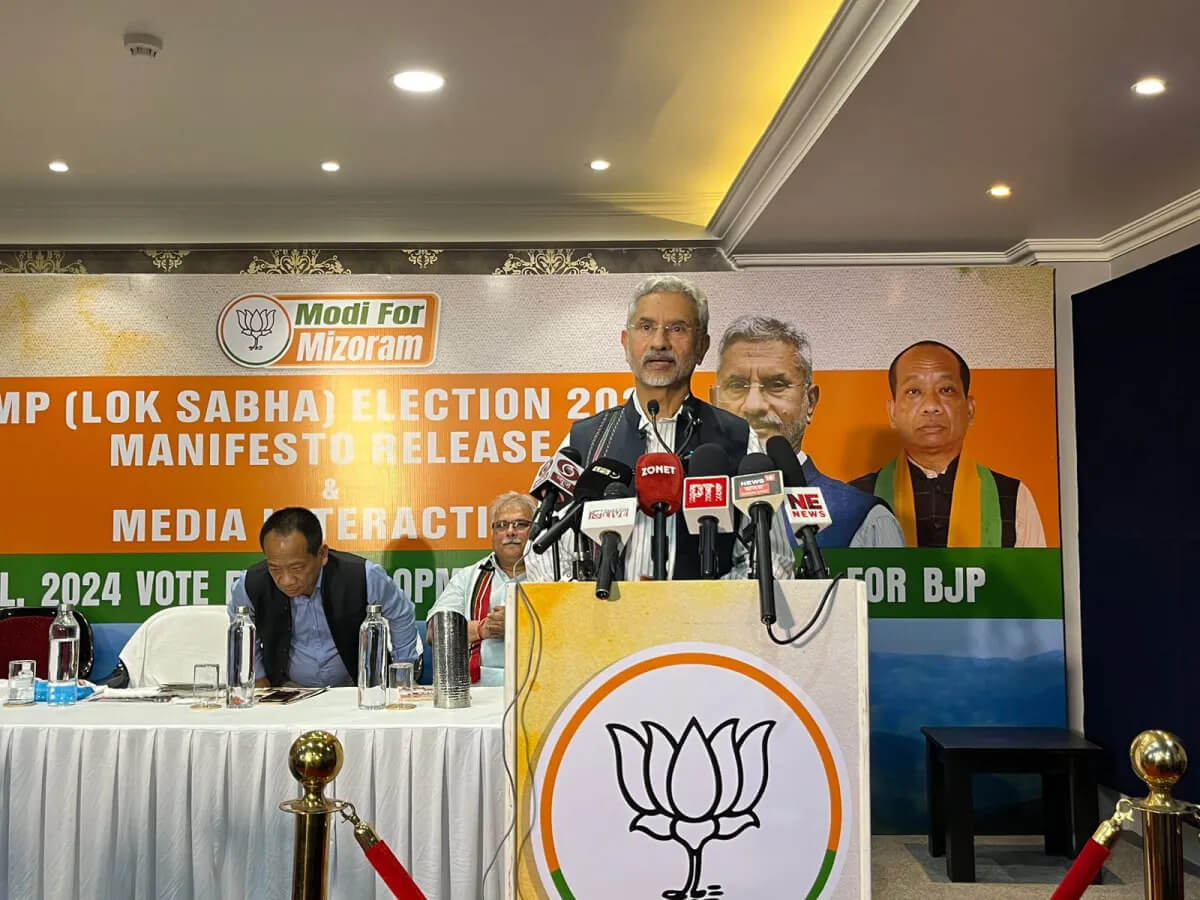On Thursday, Indian External Affairs Minister S. Jaishankar defended India’s decision to fence the Indo-Myanmar border and end the Free Movement Regime (FMR). While releasing the Bharatiya Janata Party’s manifesto for Mizoram’s upcoming elections, Jaishankar said the decision was taken to prioritise India’s security.
Ending FMR
In February, the Indian government decided to scrap the Free Movement Regime between the two nations and fence the Indo-Myanmar border, citing security concerns. Jaishankar mentioned that India is sensitive to its relationships across the border, but the condition in Myanmar is challenging. “The authority of the government does not work,” he added.
He mentioned that India was taking precautions as the neighbourhood was going through a difficult stage. Jaishankar said, “The security of our country, security of our states, including Mizoram, requires us to take certain precautions.” He added that India was taking precautions in response to the prevalent situation, and this would not have happened if things in Myanmar were normal.
#Watch: Indian External Affairs Minister S. Jaishankar said that Myanmar is facing grave security threats and India has no option but to fence the border because the security of a country is paramount.#India #Myanmar #Mizoram #Jaishankar #SJaishankar pic.twitter.com/C4SprONiIE
— Statecraft (@statecraftdaily) April 11, 2024
The EAM said that the centre was sensitive to the interests of the people, traditions, customs and relationships across the border. The FMR was established in the 1970s, allowing every member of hill tribes dwelling within 16km on either side of the border to cross the border. A border pass, typically valid for a year, allows visitors to stay for up to two weeks at a time.
Road Connectivity with Myanmar
Jaishankar also said that the Indian government prioritises building connectivity between India and Myanmar’s Rakhine state through a road in Mizoram. He mentioned that the project was unable to move forward due to problems in Myanmar, but promised that India will look into it after the elections. Additionally, he highlighted that Myanmar was a part of India’s Act East Policy, and India was negotiating with various groups to see what could be done.
Controversy Over Suspension of FMR
The decision to scrap the FMR has faced opposition. In February, the Mizoram State Assembly adopted a resolution against the centre’s decision. The resolution was introduced by Mizoram’s Home Minister K. Sapdanga, who urged the centre to revert the order and ensure that steps be taken to let the Zo ethnic people on both sides of the border live together without a fence dividing their ancestral land.
He held that the people of the ethnic group, which includes Kukis-Zomis of Manipur, Chins of Myanmar and Kuki-Chins of Bangladesh, were divided geographically by the British, and the scrapping of FMR was not acceptable.
The Treaty of Yandaboo, signed in 1826, led to the current demarcation of the India-Burma border, resulting in the division of people of the same ethnicity and culture between the two nations. Later, in 2018, India initiated the FMR to improve ties with Myanmar under its Act East Policy. Eventually, the regime was suspended in the wake of the COVID-19 pandemic and later in September 2022 after the situation in Maynmar deteriorated following the military coup.
Jaishankar backs fencing of Myanmar border, says India must give priority to security @NewIndianXpress @MEAIndia @DrSJaishankar @BJP4Mizoram @Myanmar_Now_Eng @TheMyanmarTimes https://t.co/VAF8PnIXn1
— Yeshi Seli (@YeshiSeli) April 11, 2024
The 1,643 km long international border of India with Myanmar is surrounded by Mizoram, Nagaland, Manipur, and Arunachal Pradesh. While Manipur and Arunachal are in favour of fencing the border, Mizoram and Nagaland have opposed the plan, citing ethnic affiliation with people across the border.
The centre’s decision comes after conflict broke out between the Kuki-Zo and Meitei communities last May. Manipuri Chief Minister N. Biren Singh attributed the violence in the state to the unrestricted movement of Myanmar nationals in India. The Indian government has pitted the fencing of the border and suspension of the FMR as a step to curb illegal migration and drug and arms trafficking in the region.

